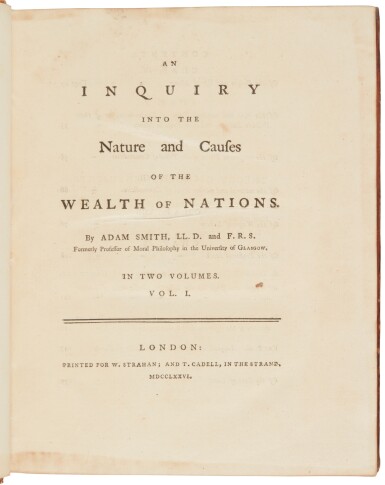
Smith, Adam | "... led by an invisible hand ..."
Lot Closed
December 9, 08:03 PM GMT
Estimate
170,000 - 250,000 USD
Lot Details
Description
Smith, Adam
An Inquiry into the Nature and Causes of the Wealth of Nations. London: W. Strahan and T. Cadell, 1776
2 vols, 4to (270 x 215 mm). Half-title in Vol. II only, as called for (not issued in Vol. I); some spotting and offsetting, a few marginal pencil markings, small tear to lower corner of Cc4 of Vol. I, B1-2 of Vol II with faint misprinting not obscuring text, small hole or paper flaw to C4 of Vol. II, old crease to D4 of Vol. II just affecting text, printing flaw to Ff of Vol. II., 4C2-3 Vol II misbound but all pages present. Contemporary calf, spines with raised bands in six compartments, red and black morocco labels to second and third, edges stained red; expert restoration to extremities including joints and spine ends.
First edition of the "first and greatest classic of modern economic thought" (PMM).
"Every individual ... generally, indeed, neither intends to promote the public interest, nor knows how much he is promoting it. By preferring the support of domestic to that of foreign industry he intends only his own security; and by directing that industry in such a manner as its produce may be of the greatest value, he intends only his own gain, and he is in this, as in many other cases, led by an invisible hand to promote an end which was no part of his intention" (IV, Chapter 2).
In a work with few rivals, Smith "begins with the thought that labour is the source from which a nation derives what is necessary to it. The improvement of the division of labour is the measure of productivity and in it lies the human propensity to barter and exchange ... it ends with a history of economic development, a definitive onslaught on the mercantile system, and some prophetic speculations on the limits of economic control ... Where the political aspects of human rights had taken two centuries to explore, Smith's achievement was to bring the study of economic aspects to the same point in a single work' (PMM).
Economic growth is one of the defining features of a modern world—something Smith advocates for through his landmark work—and this growth is often hastened by an advancement in the technologies at hand. In broad strokes, Smith’s account of history describes human civilization as moving through four different stages: the periods defined by nations of hunters; nations of shepherds; agricultural nations; and, lastly, commercial societies. For Smith, each society is deemed superior to the previous one, and this progression natural. Smith writes: "Each individual becomes more expert in his own peculiar branch, more work is done upon the whole, and the quantity of science is considerably increased by it" (Book I, Chap. I). This statement is made early on in Wealth of Nations, as Smith extolls the virtues of the division of labor. The articulation of this logic proved influential to Karl Marx and a host of others. It also also lays the foundation stones for what would later be called social science, which could be viewed as a companion to the natural sciences. And yet, Wealth of Nations also left its mark on the natural sciences.
Darwin’s debt to Smith is considerable. Indeed, while at Cambridge, Darwin wrote: “My studies consist in Adam Smith and Locke.” When he set sail in late 1831, beginning his nearly five-year voyage on Captain Robert FitzRoy's HMS Beagle (see lot 1010), Smith's influence was apparent. Upon visiting one of Brazil's rainforests, Darwin decided to apply Smith’s notion of division of labor to “specialized” species in an ecosystem. This choice was undoubtedly influenced by the work of the French zoologist, Henri Milne-Edwards, whom Darwin read while on the Beagle. Milne-Edwards argued that Smith’s idea of the division of labor could be applied to the organs of the human body. This concept was again utilized by Darwin in On the Origin of Species (see lot 1022), when he articulates the diversification inherent in nature alongside the economic principle of the division of labor: “The advantage in each group becoming as different as possible, may be compared to the fact that by division of labor most people can be supported in each country” (Darwin 457).
A handsome copy of a foundational work.
REFERENCE:
Darwin, On the Origin of Species (London: 1859), ; Goldsmith 11392; Grolier, English 57; Kress 7621; PMM 221; Rothschild 1897; Sabin 82303
PROVENANCE:
Sir Henry Wilson (armorial bookplates to front pastedowns)
You May Also Like










